Related Research Articles

Gan Shmuel is a kibbutz in northern Israel. Located in Haifa District, east of Hadera, it falls under the jurisdiction of Menashe Regional Council. In 2021 it had a population of 948. The kibbutz was named after Rabbi Shmuel Mohilever.
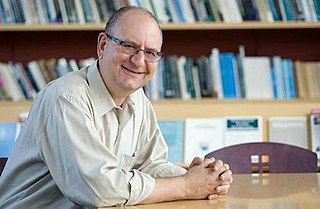
Beshara Doumani is a Palestinian-American academic currently serving as the president of Birzeit University. Prior to that, he was the Mahmoud Darwish Professor of Palestinian Studies at Brown University. His research focuses on groups, places, and time periods marginalized by mainstream scholarship on the early modern and modern Middle East. He is also a public intellectual who writes on the topics of displacement, academic freedom, politics of knowledge production, and the Palestinian condition.
The Journal of Palestine Studies (JPS) is a quarterly peer-reviewed academic journal established in 1971. It is published by Taylor and Francis on behalf of the Institute for Palestine Studies, having previously been published by the University of California Press. The editors-in-chief are Rashid Khalidi (Columbia University) and Sherene Seikaly (UC Santa Barbara). The journal covers Palestinian affairs and the Arab–Israeli conflict.
American Near East Refugee Aid (Anera) is an American 501(c)(3) non-governmental organization that provides humanitarian and development aid to the Middle East, specifically the West Bank, the Gaza Strip, Lebanon and Jordan. Founded in 1968 in the aftermath of the Six-Day War, Anera initially sought to help the hundreds of thousands of displaced Palestinians by providing emergency relief. While still providing crisis response, Anera now also addresses the long-term economic and social needs of Palestinians, Lebanese and Jordanians through its health care, education and job creation programs. By helping people meet their fundamental needs, Anera understands its work as an essential component to peace in the Middle East and restoring dignity to the people.
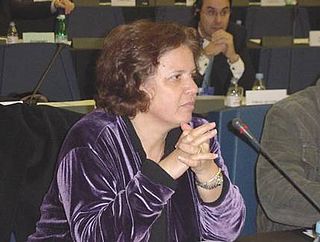
Nurit Peled-Elhanan is an Israeli philologist, professor of language and education at the Hebrew University of Jerusalem, translator, and activist. She is a 2001 co-laureate of the Sakharov Prize for Freedom of Thought awarded by the European Parliament. She is known for her research on the portrayal of Palestinians in Israeli textbooks, which she has criticized as being anti-Palestinian. Elhanan supports the Boycott, Divestment and Sanctions (BDS) movement, and has made highly controversial statements, including equivocating between Zionism and ISIS, as well as criticizing Israeli laureate and peace activist AB Yehoshua for being an obstacle to peace. She has also criticized George W. Bush, Tony Blair, and Ariel Sharon for fostering anti-Muslim views.
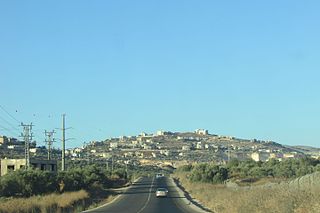
Jamma'in is a Palestinian town in the northern West Bank located 16 kilometers (9.9 mi) southwest of Nablus, 6 kilometers (3.7 mi) northwest of Salfit and 40 kilometers (25 mi) north of Ramallah. According to the Palestinian Central Bureau of Statistics, the town had a population of 6,227 in 2007.

The Tantura massacre took place on the night of 22–23 May 1948 during the 1948 Arab–Israeli War, when around 40-200 Palestinian Arabs were massacred by the Israeli Defense Force's Alexandroni Brigade, following the surrender of Tantura, a village of roughly 1,500 people in 1945 located near Haifa.

Bat Shlomo is a moshav in northern Israel. Located on the southern slopes of Mount Carmel near Binyamina and Zikhron Ya'akov, it originally was built on 8,068 dunams of land. It falls under the jurisdiction of Hof HaCarmel Regional Council and had a population of 649 in 2021.
Ezra Danin was the head of the Arab section of the SHAI, the intelligence arm of the Haganah, Israeli politician and an orange grower. Danin specialized in Arab affairs.
Nur ad-Din Masalha commonly known in English as Nur Masalha is a Palestinian writer, historian, and academic.

Nordia is a moshav shitufi in central Israel. Located in the Sharon plain near Netanya and the HaSharon Junction, it falls under the jurisdiction of Lev HaSharon Regional Council. In 2021 it had a population of 1,924.
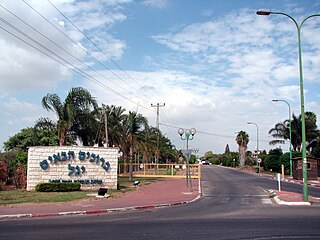
Yagel is a moshav in central Israel. Located near Lod and Ben Gurion International Airport, it falls under the jurisdiction of Sdot Dan Regional Council. In 2021 it had a population of 919.
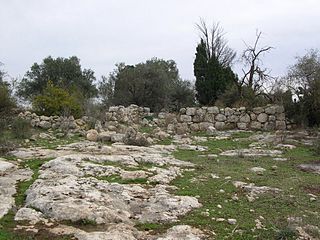
Kharruba was a Palestinian Arab village in the Ramle Subdistrict of Mandatory Palestine, near Modi'in. It was located 8 km east of Ramla. It was depopulated on July 12, 1948, during the 1948 Arab–Israeli War.

In 1948 more than 700,000 Palestinian Arabs – about half of prewar Palestine's Arab population – were expelled or fled from their homes by Zionist militias, during the 1948 Palestine war. The exodus was a central component of the fracturing, dispossession and displacement of Palestinian society, known as the Nakba, in which between 400 and 600 Palestinian villages were destroyed, village wells were poisoned in a biological warfare programme to prevent Palestinians returning, and other sites subject to Hebraization of Palestinian place names, and also refers to the wider period of war itself and the subsequent oppression up to the present day.
The Palestine Poster Project Archives (PPPA) was founded as a means of collecting and digitally displaying a wide variety of works in the Palestine poster genre. The Palestine poster genre is more than a century old and growing. The Palestine Poster Project Archives continues to expand as the largest online collection of such posters.

The 1948 Palestine war was fought in the territory of what had been, at the start of the war, British-ruled Mandatory Palestine. It is known in Israel as the War of Independence and in Arabic as a central component of the Nakba. It is the first war of the Israeli–Palestinian conflict and the broader Arab–Israeli conflict. During the war, the British terminated the Mandate and withdrew, ending a period of rule which began in 1917, during the First World War. Beforehand, the area had been part of the Ottoman Empire. In May 1948, the State of Israel was established by the Jewish Yishuv, its creation having been declared on the last day of the Mandate. During the war, around 700,000 Palestinian Arabs were displaced.

The Nakba, also known as the Palestinian Catastrophe, was the destruction of Palestinian society and homeland in 1948, and the permanent displacement of a majority of the Palestinian Arabs. The term is used to describe both the events of 1948 and the ongoing occupation of the Palestinians in the Palestinian territories, as well as their persecution and displacement in the Palestinian territories and in Palestinian refugee camps throughout the region.
Refqa Abu-Remaileh is a university teacher and author with a focus on Modern Arabic literature and film studies. Since 2020, she is associate professor in the department for Semitic and Arabic Studies at the Free University of Berlin, Germany. She is mainly known for her publications on the literature and films created by Palestinian people who often live as refugees and exiles, both in the Middle East and the world-wide Palestinian diaspora.
"Ongoing Nakba" is a term used to describe the still unfolding Palestinian "Nakba" or "catastrophe" in the wake of the 1948 Arab-Israeli War and concurrent expulsion and flight of Palestinians. The phrase emerged in the late 1990s and its first public usage is widely credited to Hanan Ashrawi, who referred to it in a speech at the 2001 World Conference against Racism. The term was later adopted by scholars such as Joseph Massad and Elias Khoury. As an intellectual framework, the "ongoing Nakba" narrative reflects the conceptualisation of the Palestinian experience not as a series of isolated events, but as "a continuous experience of violence and dispossession", or as other have termed it, the "recurring loss" of the Palestinian people.
Roy Marom is a historian and historical geographer in the University of California, Berkeley. Marom is the curator of the Palestinian Rural History Project, which specializes in the history of the Palestinian countryside during the Ottoman and British Mandate periods.
References
- ↑ Doumani, Beshara B. (1992-01-01). "Rediscovering Ottoman Palestine: Writing Palestinians into History". Journal of Palestine Studies. 21 (2): 5–28. doi:10.2307/2537216. ISSN 0377-919X. JSTOR 2537216.
- ↑ PELED, KOBI (2014). "Palestinian Oral History as a Source for Understanding the Past: Insights and Lessons from an Oral History Project among Palestinians in Israel". Middle Eastern Studies. 50 (3): 412–425. doi:10.1080/00263206.2013.871705. ISSN 0026-3206. JSTOR 24583550. S2CID 145142006.
- ↑ Marom, Roy (2022). "The Palestinian Rural History Project (PRHP): Mission Statement". RG. doi:10.13140/RG.2.2.31021.77285.
- ↑ Marom, Roy (2023-01-01). "Palestinian Rural History Project (PRHP): Gazetteer of Documented Villages". Palestinian Rural History Project (PRHP): Gazetteer of Documented Villages.
- ↑ "Narrating Palestine: The Palestinian Oral History Archive Project". Institute for Palestine Studies. Retrieved 2023-05-12.
- ↑ SLEIMAN, HANA; CHEBARO, KAOUKAB (2018). "Narrating Palestine: The Palestinian Oral History Archive Project". Journal of Palestine Studies. 47 (2 (186)): 63–76. doi:10.1525/jps.2018.47.2.63. ISSN 0377-919X. JSTOR 26407673.
- ↑ Shehabeddine, Nabila. "LibGuides: Al-Nakba: 1948 Palestinian Exodus: Oral History". aub.edu.lb.libguides.com. Retrieved 2023-05-12.
- ↑ "Palestinian Oral History Project, 2017-2020 - Archives & Manuscripts at Duke University Libraries". David M. Rubenstein Rare Book & Manuscript Library. Retrieved 2023-05-12.